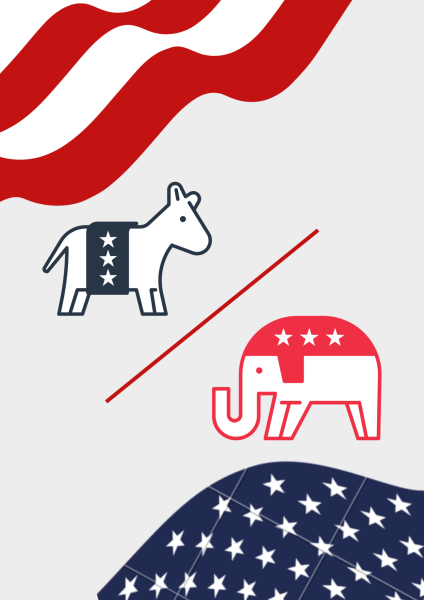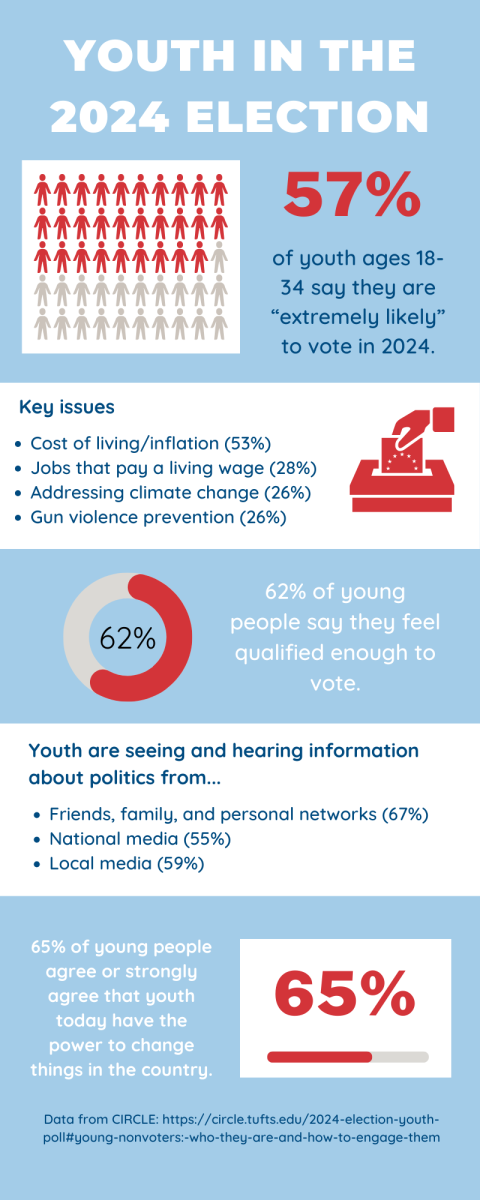The music swells to a climax every four years.
In the ongoing opus of our country’s history, each election marks a grand crescendo as different melodies vie for dominance. Each note casts its vote, but beneath the soaring sounds are the quieter, more tentative voices of the orchestra’s newest members.
Those who will cross the threshold of adulthood before November can pick up their bows and begin playing – but may struggle to be heard amidst the existing cacophony.
Seniors who are already 18 can vote in the upcoming Texas primary on March 5, and those turning 18 before November can vote in the general election on Nov. 5. However, youth participation faces challenges and new horizons, as Gen-Z voters find different ways to engage politically and give voice to the issues defining their generation.
“I guess it feels exciting, [be]cause you have this new right when you’re entering adulthood, but also in recent years, some people feel like it doesn’t matter what their vote is,” senior Angelina Dang said. “There’s not as much engagement as there should be with voting. I do sometimes feel like voting, there’s no point to it.”
According to an early poll by CIRCLE, 51% of youth aged 18 to 24 are “extremely likely” to vote compared to 62% of youth aged 25 to 34. Dang counts herself among this slight majority – she will cast her ballot in the Texas primary and general election, as will senior Ana Natraj.
“I want to at least put my effort to choose who I want and not just ignore it,” Natraj said. “It just feels bad if I don’t do anything [because] I feel like I’m not contributing to anything.”
However, Natraj said that she is not very politically engaged. Social media, rather than traditional news outlets, has played an important role in her knowledge about current events and the upcoming election.
“Especially Instagram and TikTok, I feel like that’s where everyone gets it nowadays,” Natraj said. “I feel like there is a bias, especially with TikTok, it’ll show one candidate better than the other, the whole Donald Trump versus Biden.”
AP Government teacher John Clingman also highlights the issue of bias when students source information from social media – or even traditional news outlets – that lean toward one political side or the other.

“There’s so many ways they can find stuff out, through social media and everything, it’s not like they’re focused on what’s going around, because they’re bombarded by images and issues all around them, so they’re very up to date,” Clingman said. “The only problem is, sometimes the information is very one-sided. A lot of times, if they say they’re going to get it all from here, they’re pretty much going over here to get a one-sided thing: “I get all mine from CNN” or “I get all mine from Fox News.”
Clingman says he believes that growing political polarization is a problem within society at large – one that has not gone unnoticed by Gen-Z.
“I definitely think with the Internet, people have gotten more divided, and into the extremes of both sides, and I think there’s less understanding between political viewpoints,” Dang said. “It’s very black and white to some people and I do feel concerned about that. There needs to be more conversation instead of fighting.”
Junior Rachel Yang, who will turn 18 in July, says that although she respects family and friends with different views, it’s “weird” that the two different sides have no connection.
“I wish it would be like 20 years ago, where both Democrats and Republicans could converse with each other and formulate great plans that way,” Yang said. “[Political polarization] creates an either-or mindset, like it’s us or them, especially because the stereotypes are harmful on both sides because most of the time they’re totally rational people and that’s just their beliefs.”
As the two dominant political parties move farther apart, young voters are increasingly choosing to abstain from affiliating with either side, an orientation characterized by “issue-focused” rather than “party-focused” voting.
“I feel like everything is subjective, but the party, they rather define the subjective as the objective,” senior Qia (Michael) Yu said. “They need to stand on this point, they need to argue for this point, but there’s always some implications or some indirect consequences with their idea. So rather than approach based on the party or issue, we need to stand on the fundamental of this issue.”
Though Yu is not a citizen, he said he still makes a point to research the candidates ahead of any election. Amidst the polarized climate, Yu emphasizes the need to find similarities and for the US to stand in the “global perspective.”
“We need to consolidate and collaborate with other nations in order to achieve certain goal[s], because I feel like war is just a really absurd way of solving certain issues, but rather if we can negotiate through, it will be more efficient and less casualty and increase the trust among different nations,” Yu said. “[The] U.S. is part of the Earth. We’re not absolute in term[s] of power, so I believe if we could be more collaborative then other countries will definitely be collaborative too.”

Other concerns among young people highlighted by the CIRCLE poll include the cost of living or inflation, jobs that pay a living wage, addressing climate change, and gun violence prevention.
“Less crime,” Yang said. “I’ll be able to walk alone at night in the grocery store without feeling scared. That’s just the one thing I can think of at the top of my head.”
Homelessness, artificial intelligence, and climate change are also voiced as concerns among students planning to cast their votes, but senior Justin Zhou indicates one more issue that hits close to home: public education.
“On the issue of education, particularly public education, the government should make sure that teachers get paid enough, which will hopefully increase the quality of public education and stop teacher shortages,” Zhou said. “At Clements, I have been fortunate to get many of the good teachers, but I have also had a decent amount of teachers who aren’t motivated [or] can’t teach, and I don’t necessarily blame them since they get paid too little.”
As much as the issues that Gen-Z voters care about vary, the underlying sentiment that the government must begin initiating change is widespread.
“[The government] should try to strive for a better future, fix their ideals, see what they’re doing wrong, get some constructive criticism, and understand what the newer generation asks for, instead of ignoring us,” Natraj said.
With Super Tuesday and the general election rapidly approaching, potential Gen-Z voters number over 40 million, but their participation faces one final obstacle.
“For me, the most confusing part about the election process is how primary elections work,” Zhou said. “Something that would help me understand the election process better is if there was a specific unit in school, for example, AP Government or AP US History, devoted to explaining election processes. However, currently, public education focuses on breadth and not depth of knowledge.”
Clingman explained that primaries help decide which candidates will run for president for each political party; the Texas primary is included in Super Tuesday, when the greatest number of states hold their primaries and caucuses. However, Clingman has also observed that the Electoral College can be another confusing aspect of the election process.
“Most people think that it’s a direct democracy, which means my vote votes for the president, and so, it should count,” Clingman said. “With the Electoral College, it’s majority gets all of the electoral votes.”
Beyond the election process, Dang said that it is important for youth to be educated on how to consume information, a sentiment mirrored by Yu.
“We [are] always getting influence from those media, the social media, and don’t have our own thought[s], so I wish we could do more research, read more, become more engaged,” Yu said. “Hopefully we can choose the right choice that benefit[s] the whole human development.”
Despite the challenges that face youth participation, Clingman nonetheless advocates the importance of Gen-Z voters.
“The youngsters need to realize that to be heard, they’re gonna need to speak up now because they’re gonna be lost in transition because they’re gonna be overlooked,” Clingman said. “If they want anything done, they’re also gonna have to start now, because it takes time to do any change. You can’t say “Well, I’ll just wait a little bit and it’ll be better for the change”. Start now, and by the time you’re ready for it, the change will happen.”
In the shadows, they polish their instruments. They raise their bows.
Gen-Z is ready to be heard.
This story was originally published on The Round Up on February 13, 2024.



























![IN THE SPOTLIGHT: Junior Zalie Mann performs “I Love to Cry at Weddings,” an ensemble piece from the fall musical Sweet Charity, to prospective students during the Fine Arts Showcase on Wednesday, Nov. 8. The showcase is a compilation of performances and demonstrations from each fine arts strand offered at McCallum. This show is put on so that prospective students can see if they are interested in joining an academy or major.
Sweet Charity originally ran the weekends of Sept. 28 and Oct. 8, but made a comeback for the Fine Arts Showcase.
“[Being at the front in the spotlight] is my favorite part of the whole dance, so I was super happy to be on stage performing and smiling at the audience,” Mann said.
Mann performed in both the musical theatre performance and dance excerpt “Ethereal,” a contemporary piece choreographed by the new dance director Terrance Carson, in the showcase. With also being a dance ambassador, Mann got to talk about what MAC dance is, her experience and answer any questions the aspiring arts majors and their parents may have.
Caption by Maya Tackett.](https://bestofsno.com/wp-content/uploads/2024/02/53321803427_47cd17fe70_o-1-1200x800.jpg)
![SPREADING THE JOY: Sophomore Chim Becker poses with sophomores Cozbi Sims and Lou Davidson while manning a table at the Hispanic Heritage treat day during lunch of Sept 28. Becker is a part of the students of color alliance, who put together the activity to raise money for their club.
“It [the stand] was really fun because McCallum has a lot of latino kids,” Becker said. “And I think it was nice that I could share the stuff that I usually just have at home with people who have never tried it before.”
Becker recognizes the importance of celebrating Hispanic heritage at Mac.
“I think its important to celebrate,” Becker said. “Because our culture is awesome and super cool, and everybody should be able to learn about other cultures of the world.”
Caption by JoJo Barnard.](https://bestofsno.com/wp-content/uploads/2024/01/53221601352_4127a81c41_o-1200x675.jpg)






